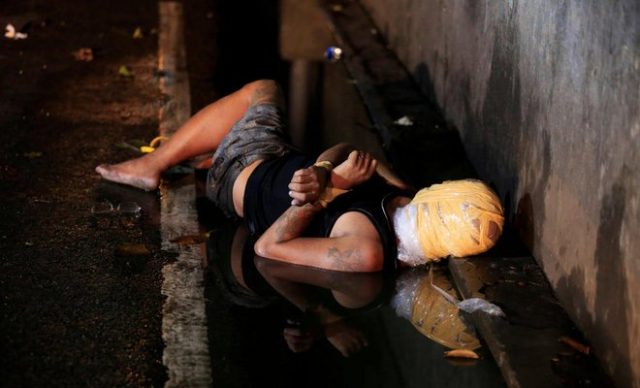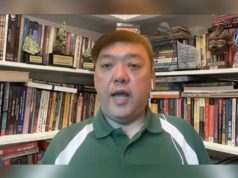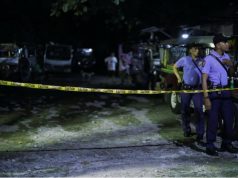
MANILA – “The President is very clearly responsible for what’s happening on his watch.” That much was asserted by Human Rights Watch-Geneva Director John Fisher, who flew into the Philippines to see for himself the situation in the country, and to talk to families of victims of extrajudicial killings. He also listed four possible scenarios on how the Duterte administration might be pressed to be accountable for allowing the killings to spiral further.
In an interview with News5’s Faith del Mundo on Sunday, he explained that accountability takes place on a number of levels.
“Obviously, those pulling the trigger or wielding a knife can be held personally responsible and accountable for their acts,” he said. “And there is the concept of command responsibility, where those who are issuing orders are also responsible for what’s taken place on their watch.”
Fisher continued, “If President (Rodrigo Duterte) is found to be inciting violence, to have knowledge of the campaign, to be inciting the campaign, to be giving orders or assurances of impunity, then of course he has responsibility for that. I mean, he’s the President of the country, he oversees the armed forces and police service, and his public statements have been very, very clear that he feels that those who are somehow associated with drug use or otherwise can and should be killed. He’s given assurances that there will be impunity for those who perpetrate these acts.”
The Philippine National Police claimed last week that there had been only one extrajudicial killing in the Phillippines since Duterte assumed office, then revised the number to zero.
Fisher said this statement simply did not conform with the facts and the international definition of extrajudicial killings, especially since the PNP itself reported that there had been thousands of people killed during the conduct of the war on drugs.
He explained that extrajudicial killings are those done without a judicial or legal process.
“In any normal judicial process, there are arrest warrants, there’s a trial, a person we presume innocent until found guilty if there’s a conviction, there’s a sentence, and hearing, and a whole series of steps that can give all of us confidence that what’s happening is in conformity with the legal process, the judicial process,” he said.
Fisher continued, “When the killing happens extrajudicially, it’s because the police or others take matters into their own hands and just kill a suspect without any of that. So those protections, those legal safeguards that give everyone the reassurance that the police are doing their jobs without exposing others to unnecessary risk” are lost.
In the case of the deaths in the Philippines, he claimed, there hadn’t been a judicial process, an attempt to bring it before a court, or a conviction.
“As there are thousands of deaths and more reported on a regular basis, the government can’t just define those bodies out of existence,” Fisher stressed. “They have to address the problem.”
According to the Presidential Communications Operations Office, 3,906 “drug personalities” were killed in anti-drug operations from July 1, 2016 to September 26, 2017. Fisher compared this to Human Rights Watch’s report in the beginning of 2017, where it said 7,000 killings “seemed to have occurred in an extrajudicial fashion.”
He believed that the “staggering death toll” was just the tip of the iceberg, as there were probably many more deaths that weren’t being reported by the victims’ families to the authorities whom they saw as the perpetrators of the crime.
Labels can’t justify killing sans due process
Asked if the administration’s war on drugs was synonymous with extrajudicial killings, Fisher replied, “Regardless of the label that’s used – and obviously the government has used the label ‘war on drugs’ just to try and justify excesses of police authority or lack of due process – no label that you attach to it can justify killing people without due process.”
He added, “The right to life is one of the most basic rights in international human rights law. Without the judicial process, there is no way of being sure that the people who are being targeted are in fact drug dealers, users of drugs, or even associated with the war on drugs or with drug use. Even if they were, it doesn’t justify killing people without due process.”
He was also concerned about threats against journalists and human rights defenders.
Possible scenarios, sanctions
Asked about the sanctions that could be imposed on the country if the killings continued, Fisher enumerated the points below.
1. The general assembly of the United Nations Human Rights Council can expel the Philippines from membership if it regularly violates its international human rights obligations.
2. As many states have spoken out against the killings, they may take this into account in their bilateral relations with the Philippines – including their economic relations. The Philippines enjoys zero duties for many of its exports under the European Union’s GSP+ scheme, and the condition for these trade perks is the Philippines’ practice of 27 international conventions, many of which revolve around human rights.
3. The UN may launch an independent investigation.
4. If violations are widespread and systematic, they can amount to crimes against humanity. This means those responsible, “including at the very top levels, can be held to account before bodies such as the International Criminal Court.”
“International law is there for everybody, and human rights are universal,” Fisher concluded. “Before the government says, ‘Well, these can’t be crimes against humanity because people who associate with drugs, they’re not humanity,’ well, you don’t get to strip people’s humanity away like that.”









